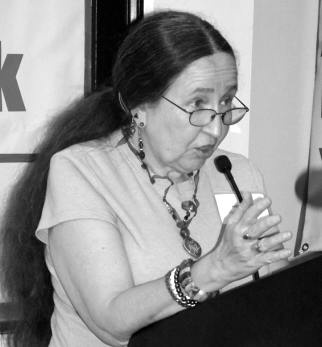Millie Phillips Speech to Labor Fightback Network Conference


Originally published on 10/5/2019
(Speech delivered in Cleveland, Ohio, on July 22, 2017. Phillips is a member of the Editorial Board of The Organizer)
It’s an honor to represent Labor Fightback Network this evening. And it’s wonderful to see so many people here.
What a strange time we are living in. On one hand is a blatantly open and direct resurgence of the most reactionary forces many of us have seen in our lifetime. Every right and benefit we have won though historical struggle is in the chopping block. By we, I mean everyone who has benefitted from the struggles of organized labor and by the range of civil rights and liberation movements.
Our very existence is threatened by climate change and a renewed risk of nuclear war. The existence of this reaction dominates our news media, preoccupied with scandals and political intrigue and racial and class stereotyping, and seemingly oblivious to the unmet needs of the vast majority.
On the other hand, in the face of these attacks, we are also seeing a resurgence of activism and the hopeful signs of people beginning to work together in resistance across lines of race, gender, and age. And not only a willingness to work together, but, just as important, an increasing willingness to respect the leadership of those on the front lines of each issue. At least in my life, I find that unprecedented. For example, for most of the past two years, I was working in a small city of 160,000, predominately white, moderately liberal but certainly not a hotbed of radicalism. The local climate change rally was led as much by the Teamster Union, who are in the process of organizing recycling workers, and by immigrant rights groups, as it was by environmental groups. The local women’s rally was one of the largest in the town’s history. Interestingly, there were almost as many Black Lives Matter and Immigrants Welcome Here signs as there were signs about women generally. There‘s a new spirit of solidarity in the air. I hear it from people I talk to around the country.
Everyone wants to know: how do we push back the onslaught of reaction? It’s clear that whatever we have done over the past 50 years hasn’t been enough to avoid arriving at these grim crossroads. Those on the front lines of attack are willing to be militant and to try new ways of struggle or revive old ways that worked for our ancestors. But some people continue to advocate doing what we’ve always done, just doing it more and better, and others say we have to tone down our demands and be realistic. Typically, these arguments come from those who are least affected by the attacks. Sad to say, the leadership of our unions has often been among the latter. The purpose of Labor Fightback Network is to help shift this conversation so that labor becomes willing to return to militancy and, in a way it has often failed to do before, becomes an uncompromising ally of progressive struggles, from Black Lives Matter to immigrant rights, to protesting the failure of act on climate change to fighting for single-payer health care and for affordable housing. What all our progressive social movements have in common is a common enemy: an economic and political system devoted to making the obscenely rich even wealthier; survival of the rest of us be damned. And, and this is our most important point, that enemy has not just one political party, but two.
Consider this: what did organized labor gain by spending $400 million, $70 million alone from the SEIU, to support Hillary Clinton, the anti-labor, pro-war candidate of Wall Street? It’s on thing to defend the Affordable Care Act against an even worse Republican proposal, but why aren’t we putting everything onto single payer: the only system that would work for all of us? It’s fine to rant about Betsy DeVos, appointed by Trump to destroy public education, but most Democrats support privatization, too? How can you tell people it was racist and sexist not support Hillary when she supports wars that murder women and children and her husband destroyed our major welfare programs? This woman who once called young men of color predators? And then we wonder why other movements aren’t flocking to help us when we are in trouble. And this is not just a problem for organized labor. At a recent resistance conference of mostly youth in the Bay Area, where I’m from, one of the founders of Black Lives Matter received standing ovations and loud applause for almost everything she said except a comment suggesting that Trump got elected because progressive activists failed to support Clinton. For that she got absolute silence and a few moans and hisses.
Let’s face it. We got to these grim crosswords because all our movements have been playing the losing game of lesser evil. The bosses have two parties, and we have none. LFN believes we need more than an electoral political movement – we need one in the streets; one where we each support each other though protest, direct action, and mutual aid. Our survival depends on it. Yet there is an electoral component and that’s, in our opinion, labor and community slates, running candidates who are answerable and accountable only to us. Within LFN, we may vary on how we interpret what the word independent means in the present moment, but we all agree we shouldn’t be supporting people who don’t support us. Is this realistic? Well is the alternative of doing the same thing realistic? And, yes, especially on a local level it is realistic right now. There are several promising examples around the country. And when we succeed in building locally, we build the power to take on regional, state, and even national elections.
LFN supports rebuilding the moment for a party of labor in alliance with the Black and Latino communities and all others who are resisting reaction. We hope one of the outcomes of our conference this weekend will be to spark a conversation within labor and among our allies about how we can get started building a effort throughout the country to make this happen. Let’s do it!

